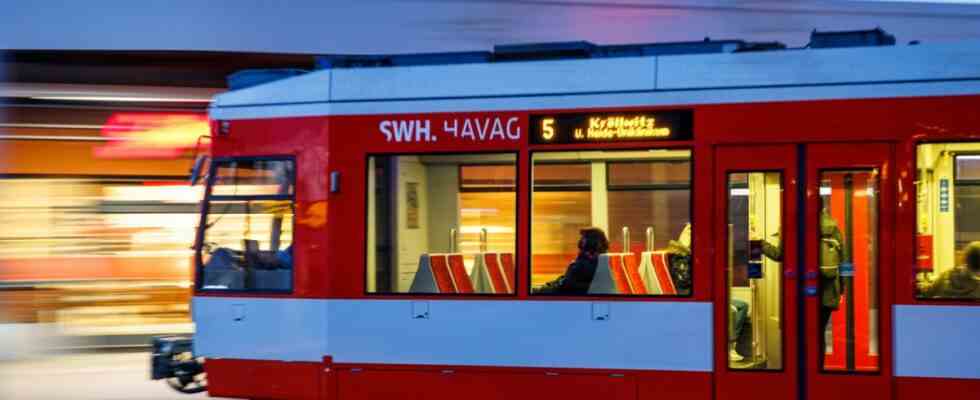In mid-March, the traffic light coalition surprised the whole of Germany with plans for a cheap local transport ticket at a nightly meeting. Since then, experts from the federal, state and transport associations have been working feverishly on the details. It has been clear since this Wednesday: For nine euros a month, people should be able to use buses and trains in local transport from June – for a quarter of a year. The discount campaign should at least partially relieve citizens of the high energy prices and make them want to use public transport again after the pandemic. the Southgerman newspaper answers the most important questions about one of the greatest experiments in the history of local transport:
What do the tickets offer customers?
Anyone who buys a nine-euro ticket should be able to use it to travel on buses and trains in local public transport in the respective calendar month. This means that anyone who buys such a ticket in Berlin can also use it on buses and trains in Hamburg, Munich or in other cities or transport associations. Holiday trips from Munich to the mountains or from Berlin to the Baltic Sea are also possible. If you have enough time, you can also cover longer distances across the country in regional trains. Only the long-distance traffic of Deutsche Bahn, i.e. the ICEs, ECs and ICs of the railways as well as the Flix trains and buses, are withheld from passengers with the ticket.
How to get the tickets?
The sale is expected to start at the end of May. The tickets are offered as online tickets. According to the Association of German Transport Companies (VDV), a nationwide app is also planned. In order not to exclude people without online access, the tickets will also be available from ticket machines and the customer centers of the railway and transport associations. They are valid until the end of the month in which they were purchased and are not automatically renewed.
How do subscription customers benefit from the low tariffs?
Anyone who already has a subscription for local transport should also benefit from the campaign. According to plans by the Ministry of Transport, local transport companies should automatically compensate for the difference between the ticket price and the nine-euro ticket. Either through a reduction in the direct debit or through a corresponding reimbursement. A similar solution is planned for semester tickets.
Are trains and buses threatening to be overcrowded in summer?
According to a first cautious estimate, the local transport association VDV expects that a total of 30 million old and new passengers will use the ticket. This would mean that many more passengers would board than would normally be the case in the summer months. The largest railway union EVG is already warning of chaotic conditions. “I expect overcrowded trains to be cleared and stations closed due to congestion,” says EVG boss Klaus Hommel. So far, no railway company has been adequately prepared for the expected rush of customers. There are currently not enough vehicles available.
According to the EVG, tourist destinations such as Lake Constance or the Baltic Sea are particularly affected. “We fear that the system will be overloaded and even come to a standstill,” warns Hommel. The Federal Ministry of Transport expects the transport companies to get the problems under control. However, the users of the tickets would have to reckon with the fact that there could be high occupancy rates, as is also the case at peak times.
What are the politicians hoping for from the discount campaign?
At the urging of the Greens, the federal government is making local transport cheaper in its energy relief package with the local transport ticket to compensate for the subsidization of fossil fuels – for example through cheaper fuel. Federal Transport Minister Volker Wissing (FDP) sees the cheap tickets as an incentive for the permanent use of buses and trains. He spoke of an opportunity to make local public transport visible again. In addition, the hoped-for changeover of many Germans to local transport would help to save energy. However, experts are calling for more money for local transport on a permanent basis so that it does not remain a flash in the pan.
Why do the federal and state governments continue to argue about money for local transport?
The conflict is about much more than financing the nine-euro monthly ticket. The federal government had agreed to cover the costs: up to 2.5 billion euros. However, the states are demanding that the federal government also pay possible additional costs beyond this amount, for example for additional buses or trains. In addition, the countries expect additional billions in aid, for example because of increased energy costs. Minister Wissing has so far rejected this. The local transport industry now even considers it possible that companies will have to reduce their offer or raise prices in the future due to increased costs. Both would run counter to the government’s goal of doubling passenger numbers by 2030 for more climate protection.
Could the cheap ticket still fail shortly before the start?
If the dispute over finances escalates, the federal states could theoretically stop the project in the Bundesrat, because they have to agree to an amendment to the regionalization law. But a veto is considered unlikely because of the upcoming state elections. In any case, the time pressure for an agreement is enormous. If the nine-euro ticket is to start at the beginning of June as promised, the Bundestag and Bundesrat must approve the plans by May 19th and 20th at the latest.

